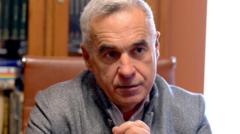Romanian politician Călin Georgescu, identified as a far-right nationalist and currently leading the presidential race, has made headlines with his declaration to terminate all aid to Ukraine if he secures victory in the upcoming elections. Set for a second-round run-off on Sunday against pro-EU candidate Elena Lasconi, Georgescu's campaign strategy, predominantly conducted through social media, emphasizes prioritizing "the Romanian people."
In a controversial assertion, Georgescu dismissed allegations from Romania's intelligence agencies suggesting that his rising popularity is linked to a significant Russian-backed influence campaign. He claimed he operates independently of "lies" propagated by the country's authorities, positioning himself as a voice for the populace. This remark comes after Romania's outgoing president released declassified documents alleging extensive and organized online support for Georgescu, tied to Russian state actors. The revelations prompted numerous requests to the Constitutional Court to investigate potential election interference.
While prosecutors have initiated a criminal inquiry into the matter, no timeline for resolution has been established. Georgescu disregarded concerns about substantial funding utilized to bolster his campaign, which reportedly violates Romanian electoral laws, by asserting that his supporters are expressing a newfound desire for national respect and dignity.
In a recent interview, Georgescu extended mixed praise for various world leaders, mentioning Donald Trump and Viktor Orban positively while simultaneously referencing Vladimir Putin as a "patriot and leader." However, he distanced himself from the Russian leader's policies and questioned the narrative surrounding Russia's military aggression in Ukraine. When pressed about Romania's role as an EU and NATO member, he insisted that his focus would remain solely on domestic priorities and that any military support for Ukraine would cease entirely under his administration.
Georgescu's potential presidency could significantly alter Romania's stance, aligning it closer with Hungary and Slovakia, who have voiced similar sentiments towards Russia. As one of NATO's eastern flank members, the implications of Georgescu's policies could weaken EU solidarity regarding Ukraine, particularly with shifts in the US political landscape possibly favoring a Trump-led administration that may not prioritize European defenses.
Despite pledging to keep Romania within the EU and NATO, Georgescu indicated that future negotiations would center around national interests. He expressed skepticism towards the portrayal of Russia as a security threat to the West.
Concerns over Georgescu's endorsement of various conspiracy theories and his unorthodox positions, including denial of the COVID-19 pandemic and lunar landing skepticism, have raised alarms among critics. His support is reportedly stronger outside Bucharest, illustrating a divide in public sentiment about his proposed direction for Romania.
In response to Georgescu's campaign and the underlying fear of Russian influence, large-scale protests erupted in Bucharest, where participants rallied for Romania's continuous alignment with Europe. Many carried EU flags, symbolizing their commitment to a future firmly anchored in European unity. As dissent grows, the narrative around Russian intervention remains a sensitive topic, fueling discussions about Romania's political independence and future alliances.



















